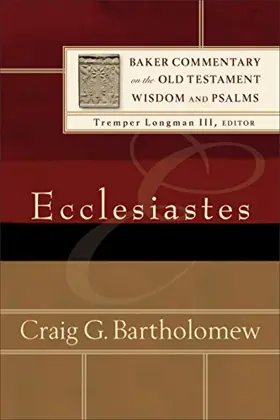

Ecclesiastes
in Baker Commentary on the Old Testament
Pages
448
Publisher
Baker Academic
Published
7/1/2009
ISBN-13
9780801097447
In this addition to the Baker Commentary on the Old Testament Wisdom and Psalms series, Craig Bartholomew, co-author of the well-received Drama of Scripture and a leading voice in the call for a renewal of theological biblical interpretation, combines a careful exegetical reading of the book of Ecclesiastes with keen theological insights. Along with helpful translation and commentary, Ecclesiastes considers the theological implications of the text and its literary, historical, and grammatical dimensions. Footnotes deal with many of the technical matters, allowing readers of varying levels of interest and training to read and profit from the commentary and to engage the biblical text at an appropriate level. All serious students of the Bible will find here an accessible commentary that will serve as an excellent resource for their study.
Collections
This book appears in the following featured collections.
- Basic Library Booklist by Detroit Baptist Theological Seminary
Reviews
This is all around the best commentary on Ecclesiastes available. In this outstanding contribution to the Baker Commentary on the Old Testament, Craig Bartholomew combines masterful exegesis with thoughtful and mature theological reflection. The commentary is readable and very accessible to the pastor or motivated lay-person without a knowledge of Hebrew. However, don't be fooled: Bartholomew packs major exegetical depth into this work. His overall take on the book is provocative and compelling, and his interpretation is undergirded with canonical sensitivity and theological instincts. He helpfully avoids the pitfalls of an entirely negative reading of Qohelet (contra, e.g., Longman) and does not make artificial or unfounded leaps in order to advance his interpretation of the book as a whole. If you are preaching, teaching, or studying this book, Bartholomew's commentary is a must have.
I have become a collector of commentaries ever since my seminary days in the 1990s. As such, I am only going to recommend the best overall commentary for each book of the Bible on this site. For Ecclesiastes, for the preacher/teacher, I give Bartholomew the edge. I would point people to "Living Life Backward" by David Gibson, Iain Provan's contribution in the NIVAC series, and William Brown in the Interpretation series, as well. Yet, overall, I think Bartholomew's fresh and full engagement with the text of Ecclesiastes makes it the go-to commentary for me.
A very helpful contribution to the number of commentaries on Ecclesiastes. Theologically and philosophically informed and oriented to hear the message of the book as God's instruction for today. Highly recommended!
Worth having, though not my first choice (Murphy). Some of Bartholomew's translations choices make the English awkward sounding. He also leans a bit too much on Barth in his interpretation section, though these sections are still fresh and valuable, and is intentionally not regurgitating the standard conclusions. His introduction is, I think, the strongest aspect of this commentary, and takes full advantage of coming after other important commentaries on Ecclesiastes, engaging well in the introduction with Longman, Murphy, Seow, but does less valuable interaction in the commentary section. The textual analysis is somewhat limited. All that said, this is still a good commentary, worth consulting, as it does have a very different feel compared to others.
The most detailed treatments of the book that also
pay attention to the theological issues
Craig Bartholomew begins his discussion of the message of Ecclesiastes with the claim that “Ecclesiastes is not first a kerygmatic book, but rather one that calls the reader to engage with Qohelet’s journey and to enter into the dialogue he evokes” (93). Accordingly, he seeks to lead the reader with him into the often confusing world of Qoheleth and then to make sense of it. Bartholomew’s prior work on Ecclesiastes (Reading Ecclesiastes: Old Testament Exegesis and Hermeneutical Theory [AnBib 139; Rome: Pontifical Biblical Institute, 1998]), as well as his role as founder-convener of the decade-long Scripture and Hermeneutics Project, has prepared him to read this enigmatic book in a fresh way. The lengthy introduction (making up more than a fifth of the text) covers the usual topics: title; canonicity; authorship and date; social setting; text; and structure. For the most part, Bartholomew does not depart from conventional critical viewpoints: the book “was regarded as authoritative well before the time of Christ” (19–20); internal and external evidence points to a postexilic origin; the book reflects the influence of various schools of Greek thought wedded to the biblical tradition; and its structure consists of a wide-ranging exploration (1:12–12:7) framed by two narratives (1:1–11 and 12:8–14).
[Full Review]



